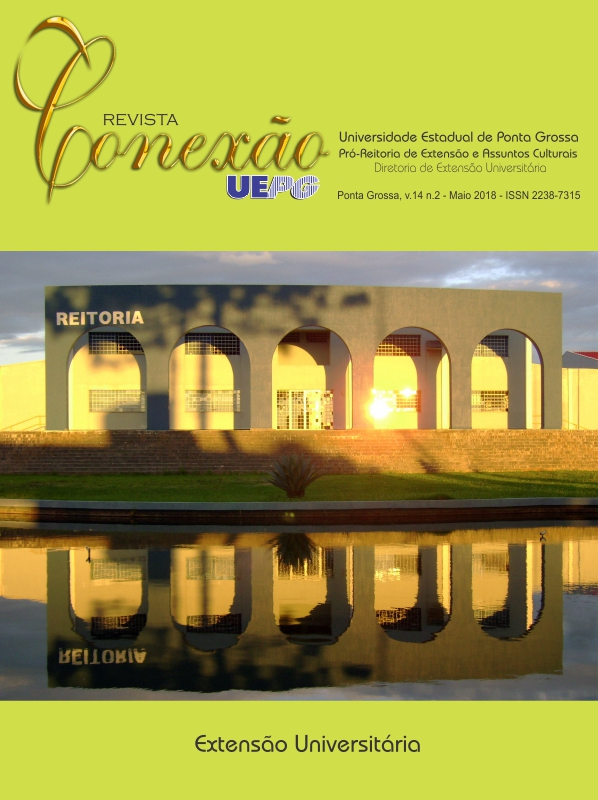JOGOS AFRICANOS E O ENSINO DE POLINÔMIOS: UMA EXPERIÊNCIA EXTENSIONISTA COM O JOGO DARA ALGÉBRICO
DOI :
https://doi.org/10.5212/Rev.Conexao.v.14.i2.0017Mots-clés :
Jogos Africanos, Matemática, Polinômios.Résumé
A inserção da “História e Cultura Afro-brasileira” no currículo escolar trouxe implicações pedagógicas no que tange à forma de trabalhá-la na disciplina de Matemática. Buscamos, então, verificar em que medida os jogos africanos podem contribuir com a aprendizagem matemática. O presente artigo apresenta impressões iniciais da ação de extensão “Jogos de origem africana e educação matemática: um olhar etnomatemático”, vinculada à Universidade Federal do Cariri (UFCA) e realizada com alunos da educação básica da cidade de Brejo Santo – CE. Tal ação envolveu o levantamento de jogos de tabuleiro africanos que apresentassem potencial pedagógico e um processo de adaptação de um dos jogos para trabalhar um conteúdo curricular da Matemática. Esse estudo culminou na elaboração do Dara Algébrico, jogo que trata de polinômios e expressões polinomiais. A adaptação de jogos africanos foi satisfatória e possibilitou o andamento de outros trabalhos que envolvessem conhecimento matemático a partir de jogos africanos.
Téléchargements
Références
BARTON, B. Dando sentido a etnomatemática: Etnomatemática fazendo sentido. In: RIBEIRO, J. P. M.; DOMITE, M. C. S.; FERREIRA, R. Etnomatemática: papel, valores e significado. São Paulo: Zuok, 2006.
BRASIL. Base Nacional Curricular Comum. Ministério da Educação. Brasília: MEC, 2017. Disponível em: <http://basenacionalcomum.mec.gov.br/images/BNCC_publicacao.pdf>. Acesso em: 18 dez. 2017.
BRASIL. Diretrizes Curriculares Nacionais Gerais da Educação Básica. Ministério da Educação. Secretária de Educação Básica. Diretoria de Currículos e Educação Integral. Brasília: MEC, SEB, DICEI, 2013. Disponível em:<http://portal.mec.gov.br/docman/julho-2013-pdf/13677-diretrizes-educacao-basica-2013-pdf/file>. Acesso em: 17 dez. 2017.
BRASIL. Lei nº. 10.639, de 9 de janeiro de 2003. Altera a Lei no 9.394, de 20 de dezembro de 1996, que estabelece as diretrizes e bases da educação nacional, para incluir no currículo oficial da Rede de Ensino a obrigatoriedade da temática "História e Cultura Afro-Brasileira", e dá outras providências. Brasília, DF, 2003. Não paginado. Disponível em: <http://www.planalto.gov.br/ccivil_03/leis/2003/L10.639.htm>. Acesso em: 17 dez. 2017.
BRASIL. Orientações e Ações para Educação das Relações Étnico-Raciais. Ministério da Educação, Secretaria da Educação Continuada, Alfabetização e Diversidade. Brasília: SECAD, 2006. Disponível em: <http://portal.mec.gov.br/dmdocuments/orientacoes_etnicoraciais.pdf>. Acesso em: 17 dez. 2017.
BRASIL. Secretaria de Educação Fundamental. Parâmetros curriculares nacionais: pluralidade cultural. Brasília: MEC/SEF, 1997. Disponível em: <http://portal.mec.gov.br/seb/arquivos/pdf/livro101.pdf>. Acesso em: 18 dez. 2017.
BRASIL. Secretaria de Educação Fundamental. Parâmetros curriculares nacionais: matemática. Brasília: MEC/SEF, 1998. Disponível em: <http://portal.mec.gov.br/seb/arquivos/pdf/matematica.pdf>. Acesso em: 18 dez. 2017.
D'AMBROSIO, U. Etnomatemática: Elo entre as tradições e a modernidade. 2. ed. Belo Horizonte: Autêntica, 2005.
GERDES, P.; DJEBBAR, A. History of Mathematics in Africa: AMUCHMA 25 Years. Lulu, Morriville. Vol. 1 (1986-1999), 2011.
GIORDANI, L. F.; RIBAS; R. P. Jogos lógicos de tabuleiro: jogos de bloqueio e alinhamento. Universidade Federal do Rio Grande do Sul, 2015. Disponível em: <http://www.inf.ufrgs.br/lobogames/wp-content/uploads/2015/09/jogos_modulo1_texto.pdf>. Acesso em: 20 dez. 2017.
LAKATOS, E. M.; MARCONI, M. de A. Fundamentos de metodologia científica. 5. ed. São Paulo: Atlas, 2003.
MALFATO, I. C. Jogos Africanos: alternativa metodológica para o desenvolvimento do raciocínio lógico e propagação desta cultura. Universidade Estadual do Oeste do Paraná, 2012. Disponível em: <http://www.diaadiaeducacao.pr.gov.br/portals/cadernospde/pdebusca/producoes_pde/2012/2012_unioeste_mat_pdp_isabel_cristina_malfato.pdf>. Acesso em: 20 dez. 2017.
PRODANOV, C. C.; FREITAS, E. C. Metodologia do trabalho científico: métodos e técnicas da pesquisa e do trabalho acadêmico. 2. ed. Novo Hamburgo: Feevale, 2013. Disponível em: <http://www.faatensino.com.br/wp-content/uploads/2014/11/2.1-E-book-Metodologia-do-Trabalho-Cientifico-2.pdf>. Acesso em: 21 dez. 2017.
PROVENZO, A. B.; JUNIOR, E. F. P. Jogue novamente, jogos de tabuleiro históricos que você pode fazer e jogar. Prentice-Hall, Inc., 1981.
RESENDE, G.; MESQUITA, M. G. B. Principais dificuldades percebidas no processo ensino-aprendizagem de matemática em escolas do município de Divinópolis, MG. EM TEIA Revista de Educação Matemática e Tecnológica Iberoamericana, Recife-PE, v. 3, n. 3, 2012. Disponível em: <https://revistas.pucsp.br/index.php/emp/article/view/9841>. Acesso em: 19 dez. 2017.
RIBEIRO, F. D. Jogos e modelagem na educação matemática. Curitiba: Ibpex, 2008.
SANTOS, F. L. F. A Matemática e o Jogo: influência no rendimento escolar. 2008. Dissertação (Mestrado em Ciências da Educação - especialidade em Educação e Desenvolvimento) – Faculdade de Ciências e Tecnologia, Universidade Nova de Lisboa. Lisboa, 2008.
SMOLE, K. S.; DINIZ, M. I.; MILANI, E. Cadernos do Mathema: Jogos de Matemática de 6º a 9º ano. Porto Alegre: Artmed, 2007.
SOUZA, A. C. F. Jogos africanos e o currículo da matemática: uma questão de ensino. Dissertação (Mestrado Profissional em Rede Nacional) - Instituto de Biociências, Letras e Ciências Exatas, Universidade Estadual Paulista, São José do Rio Preto, 2016.
ZASLAVSKY, C. Jogos e atividades matemáticas do mundo inteiro. Tradução Pedro Theobald. Porto Alegre: Art Med, 2000.
Téléchargements
Publié-e
Numéro
Rubrique
Licence
a) Os autores mantêm os direitos autorais e concedem à revista o direito de primeira publicação, com o trabalho simultaneamente licenciado sob a Creative Commons Attribution License que permite o compartilhamento do trabalho com reconhecimento da sua autoria e publicação inicial nesta revista.
b) Ao submeter um artigo à Revista Conexão UEPG e tê-lo aprovado os autores concordam em ceder, sem remuneração, os seguintes direitos à Revista: os direitos de primeira publicação e a permissão para que a Revista redistribua esse artigo e seus metadados aos serviços de indexação e referência que seus editores julguem apropriados.
c) Os leitores são livres para transferir, imprimir e utilizar os artigos publicados na Revista, desde que haja sempre menção explícita ao(s) autor (es) e à Revista Conexão UEPG e que não haja qualquer alteração no trabalho original. Qualquer outro uso dos textos precisa ser aprovado pelo(s) autor (es) e pela Revista.

Este obra está licenciado com uma Licença Creative Commons Atribuição 4.0 Internacional.





